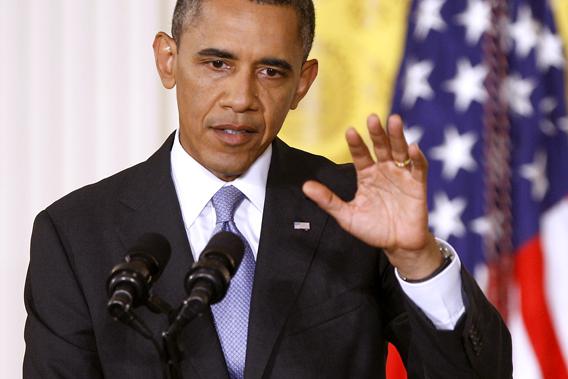Having failed to block Obamacare in Congress in 2010, or to get the Supreme Court to throw it out in 2012, or to beat Obama himself last November, conservative groups have hit upon two last-ditch methods of preventing a large new entitlement program from becoming an entrenched fact of American life. One is Utah Sen. Mike Lee’s pledge to refuse to fund the discretionary functions of the federal government unless the law is repealed. The other is an effort to bring the law down at the grassroots by encouraging citizen nonparticipation. Or as Dean Clancy of Freedomworks put it: “BURN YOUR OBAMACARE CARD.”
As there are no special cards associated with the Affordable Care Act, this plan will not work on a literal level. But on a practical level, though the odds are slim, it just might succeed. But if that boycott doesn’t succeed, the only people conservative leaders are going to end up hurting are their own followers.
The Lee pledge, while a fascinating gambit in intra-caucus politics, is impossible, as Republican members are struggling to explain to their constituents. Obamacare’s funding is “entitlement” money that gets spent automatically, so congressional Republicans cannot withhold funding. A grassroots boycott, by contrast, really might work.
The issue is that the much-litigated and much-debated “individual mandate” requiring individuals who don’t get insurance through Medicare, Medicaid, or their employer to participate in insurance exchanges isn’t really all that tough. Even someone like Boston University health economist Austin Frakt, whose analysis says the penalties are stiff enough to make the exchanges work, is relying on a penalty rate that will only be phased in over time. The immediate penalties will be smaller and not do much on their own to push people into getting coverage. That creates a several-year window of opportunity during which this element of insurance coverage expansion could unravel.
The basic problem with any health-insurance pool is that it needs a mix of people who are healthier than average and people who are less healthy than average. The premiums for the healthy people subsidize the expenses of the sick. In exchange, the healthy secure some valuable peace of mind. But to make it work you need some added incentives. The Affordable Care Act provides these incentives in the form of subsidies for the 33 percent of the population who earns less than 400 percent of the Federal Poverty Level.
Most working Americans already have health insurance because we already get a subsidy in the form of the tax treatment of insurance benefits. If your employer offers you subsidized insurance premiums as part of your compensation package, that subsidy doesn’t count as income for tax purposes. But the subsidy does have to be available to all full-time employees. So the government gives employers a subsidy that they use to subsidize insurance premiums. That creates the extra incentive to participate in the employer risk-pool and makes health insurance work.
People trying to buy insurance outside the employer framework currently have no such sweetener. Obamacare works by spending money to create new sweeteners for people outside existing employer-sponsored risk-pools. This is key to conservative hatred of Obamacare: They cost money and that money comes largely from taxes on rich people, which Republicans hate. But even though the subsidies are at the heart of the political controversy, the campaign to convince people to sign up is based on ignoring their existence, in order to make the law look like a bad deal.
Websites like Americans for Prosperity’s Obamacare Risk Factors, which promises an individualized assessment of the law’s impacts, simply ignore the existence of subsidies, even though just 10 percent of the national uninsured population is ineligible for them. Starting this fall anyone who goes online to start the process of shopping for a plan will be shown the subsidies as part of the White House plan to sell Obamacare. But as Clancy says, the conservative plan is “to make it socially acceptable to skip the exchange” so people will never find out. April polling showed that the depth of public ignorance around the law remained profound, with about 40 percent of all respondents and half of under-30s unaware that the Affordable Care Act is still the law of the land at all.
The odds of this bamboozlement working on a large enough scale to derail the law are slim. The relevant population of twentysomething uninsured people is quite liberal, and in a war of words it will end up trusting Obama and his allies over conservative activists.
But that hardly means that conservatives won’t persuade anyone: They’ll end up persuading many grassroots conservatives not to participate. Trying to trick people into not exploring the potential benefits of a new government program is a rather novel tactic in American politics, perhaps because it’s blatantly immoral. But conservative leaders truly believe the ACA is disastrous for the country and are more than willing to sacrifice the concrete interests of their followers to undermine it.
